Large Blaze in Tehran Bazaar Engulfs 30 Businesses
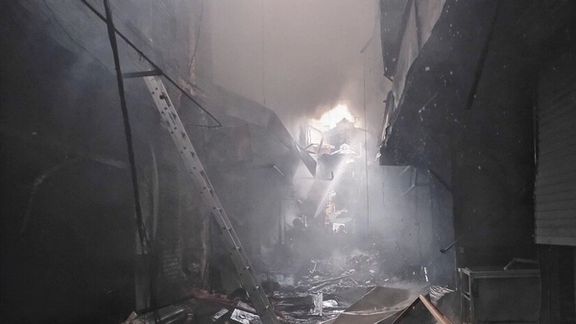
A large blaze that started at 7:38 Saturday morning, local time in Tehran’s bazaar has engulfed at least 30 businesses, according to the city’s fire department.

A large blaze that started at 7:38 Saturday morning, local time in Tehran’s bazaar has engulfed at least 30 businesses, according to the city’s fire department.
Jala Malaki, spokesperson of the department told local media that the fire started in one of the older parts of the sprawling bazaar when all shops were still closed. Around 30 retail businesses were completely engulfed by the fire and some walls have collapsed, he said.
Authorities had not announced the extent of monetary damage and losses as of noon local time, and there was no word about possible casualties. There is also no information about the possible causes of the incident.
Fire crews from at least six stations were battling the blaze almost five hours after it started.
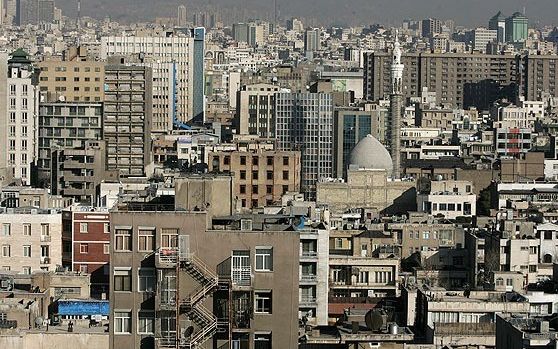
Rents in the Iranian capital Tehran increased by 54 percent in January compared with last year, as annual inflation hovered around 40 percent and demand rose.
Real estate prices have increased sevenfold since 2018, which has put pressure on rents, experts say. Although home prices have not risen much in recent months, rents keep climbing because there is a time lag between purchase price increase and rents.
In some instances, rents equal the total income of a wage earner who is paid about $150 a month in a fulltime job. Meanwhile, food prices rose by 60 percent in 2021 compared with the previous year.
Home prices rose in local currency because real estate is a major asset protecting savings in a country like Iran where the national currency has lost value almost eightfold since 2017. In countries without an internationally accepted currency, wealth can disappear with devaluation and people rush to protect their capital.
Calculated in US dollars, real estate prices have stayed the same in four years.
Rising home prices in local currency pushe the middle class out of the market and increases demand for rentals.
Pundits and politicians in recent weeks have been warning of a social explosion in the country if the economy does not improve soon. Iran is negotiating with the United States over its nuclear program. An agreement can lift US sanctions and provide much-needed revenues.
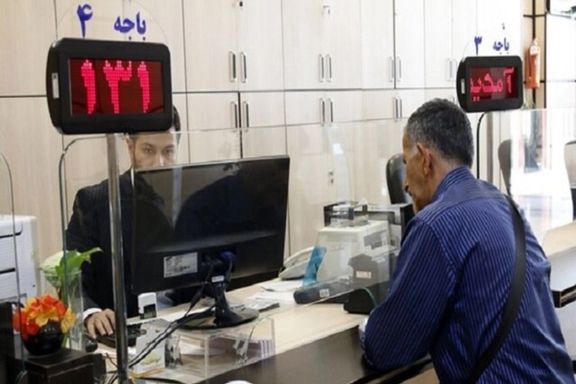
Iranian banks refuse to give government-mandated mortgages and loans to people, saying they don’t have the needed funds to comply with regulations.
According to a report by Aftab news on Friday, loans to help people pay their mortgages and rents were ratified by the government and the ministry of roads and urban development but the Central Bank of Iran has sided with the banks that say they don’t have the necessary funds.
Some applicants say when they tell the banks that the ministry has approved the $2,800 loans, the banks reply that the ministry may have decided, but no one has provided funding for such loans.
Under heavy pressure to help citizens impoverished by current economic crisis, the government has made promises to help low-income citizens.
The government has also increased the amount of the “marriage loans” to increase the population – a favorite goal for the country’s Supreme Leader Ali Khamenei. The banks are told to offer $4,000 loans, but according to reports about 35 percent of applicants didn’t manage to receive any money.
The government has also proposed loans for childbearing in next year’s budget, with the amount increasing with each additional child.
According to Iran’s head of the Center for Strategic Research on Population, Iran has now the lowest birth rate in the Middle East after experiencing the fastest decline in births during the past three decades.

Turkey arrested eight people in an alleged Iranian plot to assassinate Israeli-Turkish businessman Yair Geller in revenge for killing of its nuclear scientist.
According to local media on Friday, the Turkish intelligence agency, MIT, shared the information with Mossad when they were certain about the assassination attempt.
The Iranian spy cell was comprised of nine operatives, some Iranian and some Turkish, who planned to kill the Istanbul-based tycoon, who owns an engineering company specializing in aerospace and defense technology.
The hit was planned as a retaliation for the killing of Mohsen Fakhrizadeh, who was known as the "father of Iran's nuclear weapons program" and was assassinated outside Tehran on November 26, 2020, in an operation widely attributed to Mossad.
The Turkish media reports say the hit squad followed Geller to his home and workplace and was planning to use Turkish citizens to carry out the assassination to avoid detection.
Following a months-long surveillance operation, eight out of nine members of the cell were arrested by the Turkish police. The ninth member, who was the squad’s leader in Iran, was identified as Yasin Taheremamkendi, purportedly with links to the Iranian intelligence agencies.
Turkish media reported Wednesday that the country’s intelligence had arrested 17 people allegedly linked to Iranian intelligence who were planning to kidnap an Iranian dissident.
Iran has been implicated in many assassinations, kidnappings and terror attacks abroad against dissidents and opponents.
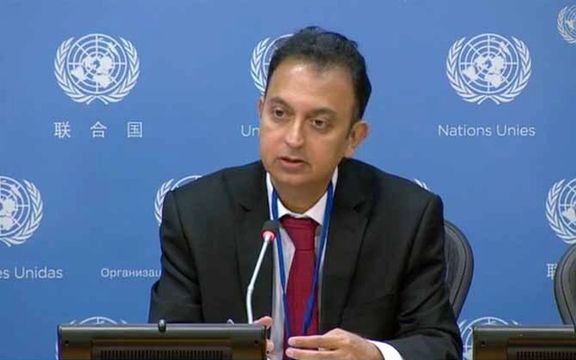
In a report provided to media this week, the United Nations Special Rapporteur on Iran has highlighted the detention of foreign and dual nations.
Javaid Rehman’s report was provided to the media this week. He will present the report to the United Nations Human Rights Council (UNHRC) between February 28 and March 3.
The report says that “many of those arbitrarily detained [in Iran] have serious underlying medical conditions that have been left untreated, or health conditions that have significantly deteriorated.” Rehman suggests the prisoners are a “means to put pressure on foreign governments."
Iran has always argued that those convicted by its courts have received due process and rejected Rehman’s earlier reports. Rehman, a professor at Brunel University, has not visited Iran since he was appointed in 2018, because Iran has banned UN and other human rights investigators from visiting the country.
Javaid’s focus in the report is on American, British, French, German, Austrian, and Swedish prisoners in Iran, several of whom were convicted by Revolutionary Courts on vague security charges after trials that do not meet international standards of due process. The accused often cannot choose their defense attorneys and they have no access to prosecution cases. Trials take place behind closed doors, and duration of detentions before trial are arbitrary. International human rights organizations have documented numerous instances of violations.
Javaid’s new report also expresses concern over threats against foreign-based journalists and their families inside the country and urged Iran to ensure that “human rights defenders…are not threatened with or subjected to intimidation, harassment, arbitrary arrest, deprivation of liberty or life or other arbitrary sanctions."
Rehman cites the case of Ahmadreza Djalali, an Iranian-Swedish emergency-medicine and disaster specialist, who he says was in prolonged solitary confinement after November 2020 and is in urgent need of surgery and dental care.
Rehman also urges Iran to conduct an “independent, impartial and transparent inquiry” over the 2019 fuel protests and to hold to account “all perpetrators of human rights violations” during those and other protests, including those in Khuzestan province and Esfahan in 2021.
The UN Special Rapporteur reports that in the first 11 months of 2021, at least 275 people were executed in Iran, including at least two under 18 at the time of their offence. He says that drug-related executions went up year-on-year during the 11 months and that there was an increase in executions of those from two non-Persian minority ethnicities, Baluchis and Kurds.
"The serious shortcomings in the legal framework and justice system, together with systemic violations of due process and fair trial, render most, if not all, executions in the Islamic Republic of Iran arbitrary deprivation of life," Rehman writes. The rapporteur highlights the case of Khezr Ghavidel, whose exoneration by the Supreme Court in July 2021 came nearly a year after his execution for drug offences.
In a response in October to a previous report from Rehman, Zahra Ershadi, Iran’s deputy ambassador to the UN, said such efforts aimed “to use human rights as an instrument against other countries" and that the rapporteur had used information provided by "terrorist groups" whose hands were “covered with blood.”
Ershadi said that Western countries, especially Canada, had pressed for Iran to be singled out as one of the few countries allocated such a rapporteur.
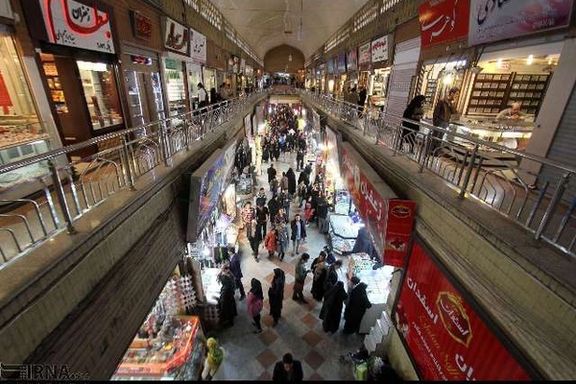
A recorded message against Iran’s Supreme Leader Ali Khamenei was broadcast on the public announcement system in Mashhad’s bazaar, videos in social media show.
Hossein Davari, governor of Iran’s second largest city and an important religious center, said that a recording on a USB device “was broadcast for a few seconds” in one part of the bazaar on Wednesday. He did not explain how the recording has reached the PA system.
People present in the bazaar have said that the PA system was hacked and for an extended time anti-Khamenei and anti-Khomeini messages were being broadcast.
In the videos loud voices are heard chanting “Death to Khamenei” and “Khomeini be damned”. Friday is the 43rd anniversary of Iran’s 1979 revolution led by Ayatollah Ruhollah Khomeini, a conservative cleric who established the Islamic Republic.
In repeated mass protests since 2017, demonstrators often chanted “Death to Khamenei” and “Death to the dictator”.
Hackers had recently penetrated the government-controlled state television, interrupting regular programming had broadcasting anti-regime messages. A group calling itself ‘Edalat-e Ali’, or ‘Ali’s Justice’ claimed responsibility. The hackers’ group had also penetrated Iran’s prison system last year and recently, accessing files and CCTV footage.